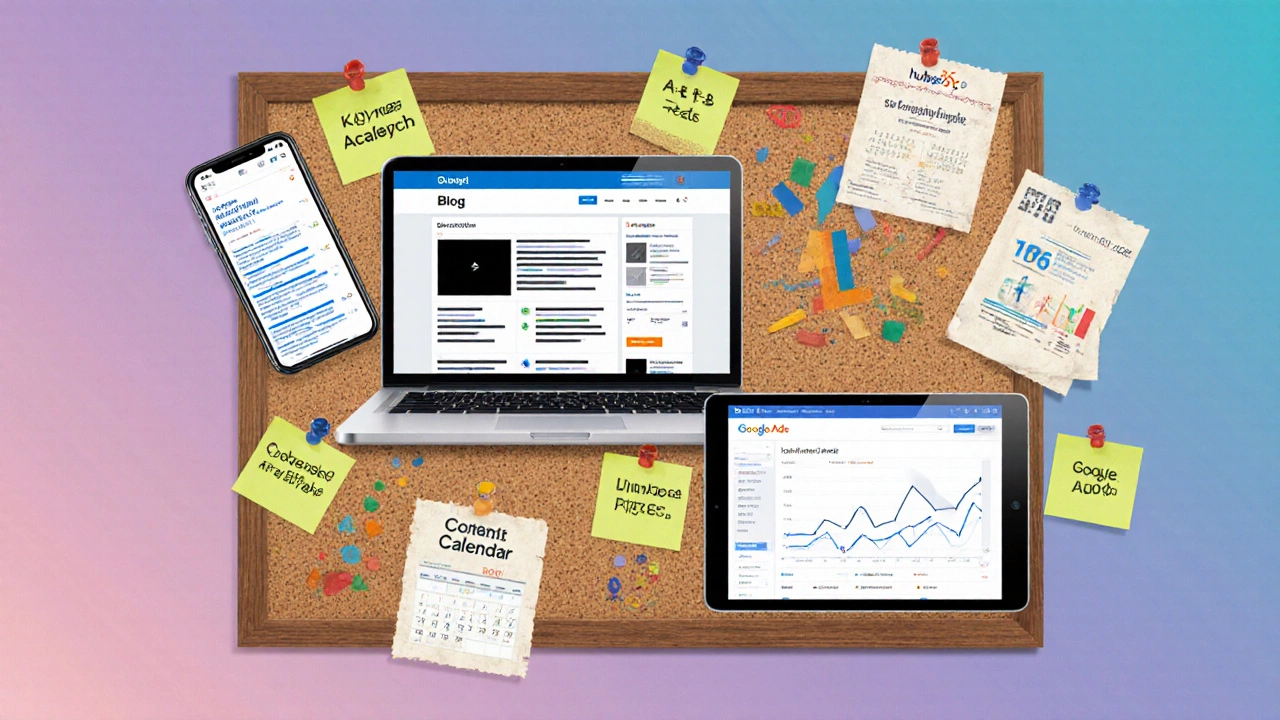Digital Marketing Skills Planner
Use this planner to estimate your learning timeline and identify key skills for your digital marketing career path.
Core Skills Overview
Select skills you'd like to develop for your career path:
SEO
Keyword research, on-page optimization, link-building, Google Analytics
Content Marketing
Blog writing, video scripting, content calendars, performance analysis
Social Media
Community management, paid social, platform strategy, analytics
PPC
Google Ads, bid management, conversion tracking, ROI reporting
Email Marketing
Automation tools, segmentation, copywriting, A/B testing
Your Personalized Learning Plan
Selected Focus Area:
Based on your estimated timeline of , here's a suggested plan:
- Foundation Modules 4 weeks
- Certification Preparation 2-4 weeks
- Portfolio Project 4 weeks
- Freelance Experience 4+ weeks
Tip: Combine your primary interest with one or two complementary skills for maximum career flexibility.
Want to break into the world of online promotion but don’t know where to start? This guide walks you through everything you need to launch a digital marketing career - from grasping the basics to landing your first role.
Key Takeaways
- Digital marketing combines several specialties - SEO, content, social, PPC, and email - each with clear skill sets.
- Free resources and affordable certifications (Google Analytics, HubSpot) can get you job‑ready in 3‑6 months.
- Build a portfolio with real‑world projects: personal blogs, freelance gigs, or volunteer work.
- Network on LinkedIn and attend local meet‑ups to unlock hidden job opportunities.
- Avoid common traps like chasing every trend; focus on mastering core fundamentals first.
What is Digital Marketing?
Digital Marketing is the practice of promoting products or services using online channels such as search engines, social media, email, and paid advertising. It covers everything from creating compelling content to analyzing data that drives business decisions.
Core Skills You Need to Master
While the field is broad, most entry‑level roles revolve around a core set of skills. Get comfortable with each, and you’ll be ready for a wide range of positions.
- SEO is the practice of optimizing website content to rank higher in search engine results. Learn keyword research, on‑page tweaks, and basic link‑building.
- Content Marketing involves creating and distributing valuable, relevant content to attract and retain a target audience. Practice blog writing, video scripting, and content calendars.
- Social Media Marketing means using platforms like Instagram, Facebook, and TikTok to build brand awareness and engage customers. Focus on community management and paid social basics.
- Pay‑Per‑Click (PPC) advertising places ads on search engines or social platforms and charges only when users click. Start with Google Ads and Facebook Ads fundamentals.
- Email Marketing is sending targeted messages to a list of subscribers to nurture leads and drive conversions. Master list segmentation, copywriting, and A/B testing.

Learning Paths and Certifications
Formal degrees aren’t required, but certifications give you credibility and a structured learning roadmap.
- Google Analytics certification covers data collection, reporting, and analysis for website performance. It’s free and widely recognized.
- HubSpot Academy offers inbound marketing, content, and email courses that combine theory with hands‑on labs. Their certifications are valued by many agencies.
- The Google Ads certification teaches you how to create, manage, and optimize paid search campaigns - essential for PPC roles.
- Platforms like Coursera, Udemy, and LinkedIn Learning host beginner‑to‑advanced tracks in SEO, social media, and analytics, often priced under $100 per course.
Set a timeline: 4 weeks of basics, 4‑8 weeks of a focused certification, then start a portfolio project.
Build a Portfolio That Gets Noticed
Employers want proof you can deliver results. Your portfolio should showcase at least three real‑world pieces:
- Write a blog series on a niche topic, optimize it for SEO, and track traffic growth using Google Analytics.
- Create a mock social media campaign for a local business - outline objectives, content schedule, and measured engagement.
- Run a small Google Ads test budget (e.g., $50) for a personal project, then present ROI calculations.
Document each case study with screenshots, data tables, and a brief narrative of your role and outcomes. Host the portfolio on a simple WordPress site or a free Squarespace page - make sure the URL looks professional.
Landing Your First Digital Marketing Job
Job hunting in digital marketing is part strategy, part networking.
- Optimize your own profile. Treat your resume and LinkedIn as a landing page - include keywords like “SEO,” “content creation,” and “Google Analytics.”
- Apply to entry‑level roles. Look for titles such as “Marketing Coordinator,” “Junior SEO Specialist,” or “Assistant Content Marketer.” These often require 0‑2 years of experience.
- Leverage freelance platforms. Sites like Upwork or Fiverr let you earn while building client references.
- Network locally. Attend meet‑ups in Edinburgh or join virtual groups on Slack and Discord. Many hires come from referrals.
- Prepare for interviews. Be ready to walk through your portfolio, discuss metrics you improved, and answer scenario questions (e.g., “How would you increase organic traffic by 20% in six months?”).

Common Pitfalls and Pro Tips
Even motivated newbies stumble. Here’s how to avoid the most frequent mistakes.
- Don’t chase every new tool. Focus on mastering core platforms (Google Analytics, WordPress, Meta Business Suite) before exploring niche software.
- Don’t ignore data. Every campaign should be measured; learn to read dashboards and report insights.
- Show, don’t just tell. When interviewing, bring concrete numbers - e.g., “Boosted click‑through rate from 1.2% to 2.8%.”
- Stay updated. Subscribe to industry newsletters like Search Engine Journal, Marketing Land, and HubSpot Blog to keep up with algorithm changes.
Comparison of Common Digital Marketing Roles
| Role | Core Skills | Typical Salary (USD) |
|---|---|---|
| SEO Specialist | Keyword research, on‑page optimization, link‑building, Google Analytics | $55,000 - $70,000 |
| Content Marketer | Copywriting, editorial planning, SEO basics, content performance analysis | $50,000 - $65,000 |
| Social Media Manager | Platform strategy, community engagement, paid social basics, analytics | $48,000 - $63,000 |
| PPC Analyst | Google Ads, bid management, conversion tracking, ROI reporting | $60,000 - $78,000 |
| Email Marketing Specialist | Automation tools, segmentation, copywriting, A/B testing | $52,000 - $68,000 |
Frequently Asked Questions
How long does it take to become employable in digital marketing?
If you study full‑time, you can earn a solid foundation and a certification in 3‑4 months. Add a portfolio project and a few freelance gigs, and most employers consider you ready within 6‑9 months.
Do I need a college degree to get a digital marketing job?
A degree can help but isn’t mandatory. Real‑world results, certifications, and a strong portfolio often outweigh a traditional diploma for entry‑level roles.
Which certification offers the best ROI?
Google Analytics and Google Ads certifications are free and valued across the industry. HubSpot’s inbound marketing certificate is also low‑cost and well‑recognised by agencies.
Should I specialize early or become a generalist?
Start broad to understand all channels, then specialize based on what excites you most or where market demand is highest. Many professionals begin as “digital marketing generalists” before moving into niche roles.
How can I get my first client as a freelancer?
Offer a free audit to a local business, showcase the results on your portfolio, and ask for a testimonial. Platforms like Upwork also let you bid on small projects to build credibility.





Write a comment